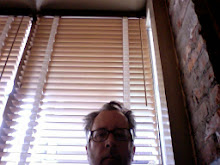Smoke and glass on the Bowery
With downtown Manhattan morphing into what looks like a suburb of Houston or Los Angeles—it’s hard to tell in which city the boxy condos and hotels sprouting up would best fit—there seems to be little, well, grit left. This is especially true on the Bowery, which is essentially turning into a Fifth Avenue for well-minted arrivistes; a new art museum recently joined the glassy condos and boutiques that are effacing the very soul of the street. But one holdout, the Bowery Poetry Café, still hums with the right stuff.
I recently went to hear a band called Search there. I know the trumpet player, R.J. Avallone, from a music store in midtown where he works. He is the odd man out there—like a Brooklyn dweller stuck in Queens—because the shop is primarily devoted to saxophones. Like many who study in Boston, Avallone has come to New York to find his niche, because it ain’t in Beantown. There's a sameness to much of the jazz experience these days, but on this particular night a whiff of marijuana in the air in the Bowery Poetry Café and a band taking its cue from Ornette Coleman’s classic quartet made it seem like possibilities still exist.
Coleman’s music is infused with blues while resisting the easy or obvious aspects of the blues—not to mention bop, with which he has long had a dialogue across a smoky room. His tunes stop, start, weave, and bend; sometimes it seems as if Ligetti or Ives had peeked around the corner and tossed in a word of advice. The rhythm section is invited—compelled, in fact—to change grooves, and the horns can improvise from points all across the spectrum. Search's tunes shared these qualities, and as a result they kept my attention for the whole set. I can’t name the tenor player—I didn’t catch it at the gig and it isn’t listed on the band’s website—but he had the blustery, edgy tone of Dewey Redman, and seemed intent on making it felt. In an age of technique-obsessed players with brittle tone—who tend to play avalanches, not ideas—it’s refreshing to hear somebody focused on sound, and the line. As for Avallone, he mixed things up, moving from boppish lines to the smears—skid marks, as one old teacher of mine used to call them—that were the hallmark of Don Cherry’s style. A strong band that will get stronger over time.
The crowd was small, but in New York today that's all you can ask, and in the end it's probably what made the evening so cool. I doubt any of the folks in the nearby condos came, but that’s their loss. And anyway, they're not interested in finding anything that Search is looking for.
I recently went to hear a band called Search there. I know the trumpet player, R.J. Avallone, from a music store in midtown where he works. He is the odd man out there—like a Brooklyn dweller stuck in Queens—because the shop is primarily devoted to saxophones. Like many who study in Boston, Avallone has come to New York to find his niche, because it ain’t in Beantown. There's a sameness to much of the jazz experience these days, but on this particular night a whiff of marijuana in the air in the Bowery Poetry Café and a band taking its cue from Ornette Coleman’s classic quartet made it seem like possibilities still exist.
Coleman’s music is infused with blues while resisting the easy or obvious aspects of the blues—not to mention bop, with which he has long had a dialogue across a smoky room. His tunes stop, start, weave, and bend; sometimes it seems as if Ligetti or Ives had peeked around the corner and tossed in a word of advice. The rhythm section is invited—compelled, in fact—to change grooves, and the horns can improvise from points all across the spectrum. Search's tunes shared these qualities, and as a result they kept my attention for the whole set. I can’t name the tenor player—I didn’t catch it at the gig and it isn’t listed on the band’s website—but he had the blustery, edgy tone of Dewey Redman, and seemed intent on making it felt. In an age of technique-obsessed players with brittle tone—who tend to play avalanches, not ideas—it’s refreshing to hear somebody focused on sound, and the line. As for Avallone, he mixed things up, moving from boppish lines to the smears—skid marks, as one old teacher of mine used to call them—that were the hallmark of Don Cherry’s style. A strong band that will get stronger over time.
The crowd was small, but in New York today that's all you can ask, and in the end it's probably what made the evening so cool. I doubt any of the folks in the nearby condos came, but that’s their loss. And anyway, they're not interested in finding anything that Search is looking for.


<< Home